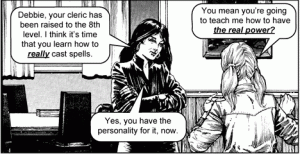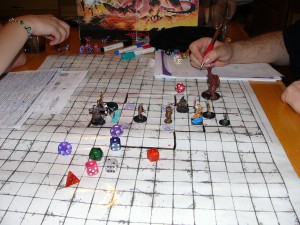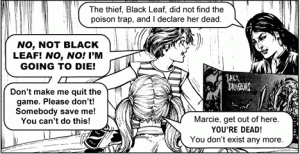It would be difficult to find someone who doesn’t have some sort of immediate reaction (positive or negative) to hearing the phrase Dungeons and Dragons. The many incarnations of the popular role-playing game have sparked both joy and fear in its 41-year history; though an estimated 20 million people in the world have played the game, earning over $1 billion for its owner, Wizards of the Coast.
But starting in about 1982, a wave of concern about the game washed over the United States. That June, a worried mother founded an organization which attempted to convince people that D&D was dangerous. Six months later, Tom Hanks starred in a movie about a young man who went insane as a result of a game called “Mazes and Monsters”.

Among other things, this kicked off quite a bit of furor in the Christian community. Rumors flew about the dangers of role-playing games and the “training” it gave players in the occult and satanism, as well as the psychological damage it did to players. Though the claims were untrue, they flew about evangelical circles at a remarkable speed for a pre-Facebook world.
So what’s the reality behind Dungeons and Dragons?
The Truth Behind the Dice

Put simply, RPGs are just what the name implies – games in which one plays a role. Specifically, in the case of D&D, a player takes up the role of a daring adventurer as they seek to accomplish…well, whatever goal the person running the game sets for them. Usually played in parties of 5 (with one telling the story while the others dictate the actions their characters take), it promotes creativity, teamwork, ingenuity, attention to detail, problem-solving, storytelling…actually, there isn’t much that it doesn’t promote.
Depending on the storyteller (known in D&D parlance as the “Dungeon Master” or DM), the goal can range from saving a group of innocent halflings from an attacking band of goblins to saving the world from a cataclysm beyond imagination. Sometimes magic is allowed, sometimes it is discouraged; but in either case, this magic is of a fantastical nature, in the vein of Gandalf or Merlin; far from being a “gateway” to any real occult or magical practice.
But how could this possibly point us to God?
God Made D&D
Dungeons and Dragons is, at its core, a creative game. As a DM, your task is to invent unique and fun situations and stories for your players to participate in; as players, you must come up with a character with an interesting back story, stats and abilities that match up with that back story, and a personality to match. A game of D&D is a unique combination of scriptwriting, puzzle design, world-building, acting, and mental calisthenics.

This is no surprise to RPG players. But what may be a surprise is that all of this is a faint echo of God’s reality.
The reason that each element of D&D is fun is that God did it first, and He wired us to enjoy the things that He enjoys; we enjoy building fantastic new worlds to inhabit because God created our world from nothing. We love populating it with colorful characters from all across the alignment spectrum because that was His way of filling this world. And we get a thrill out of the action because God created our world to be good, but His creation turned to evil – and all of human history has been, in the truest sense of the word, an epic quest to save the universe.
Jesus is Chaotic Good…
The fact that so many D&D campaigns are about saving something from a great evil is no mistake; God wired it deep within us. Our ears are supposed to perk up at a great story about fighting off evil in the name of good. Christ was sent to Earth to defeat the greatest of all evils, an insidious evil that lurked in each of our hearts; sin. It was an enemy so evil that he had to sacrifice his life to defeat it.

But while Jesus was the ultimate Good on the alignment scale (he defines good on the alignment scale!), Jesus was far from a paladin. In fact, the Lawful Good characters he met during his time on Earth – the Pharisees, leaders of the religious establishment – were his most recurrent enemies. They fought and sparred with him time after time, challenging him on nearly everything he said, until they finally conspired to have him put to death.
And although He died, He is alive again – not as some animated undead, and not even with any level drain. No, He was raised with the most perfect of True Resurrections, which (as you know) is no easy feat. It was so perfect that He will never die again.
…We are Neutral Evil
You may be thinking that you’re not so bad, but the disease of sin runs deep. It affects us all, and it isn’t cured easily. Its side-effects are painful and deadly. The reason this whole world is falling apart around us is because of those side-effects. We have to stop it. We have to be free. And there’s only one way.

But unfortunately, like a really bad level drain poison, curing the disease doesn’t immediately curb its side-effects. All of us were originally affected by that disease; our sin is strong, and it can continue flowing out of Christians even after Christ has saved them. Even worse, some people who aren’t Christians like to pretend to be (with predictable results). For both of these types of people, the tragic truth is that they become like the Pharisees of old. They feel duty-bound to end sin whenever they see it.
So, gamers: if you’ve been attacked, yelled at, or even glared at by a Christian who doesn’t like your D&D playing (or Harry Potter, or comic books, or rock ‘n’ roll, or whatever the Christian culture thinks is bad), I sincerely apologize on behalf of Christians. We mess up. Some of us do so spectacularly. Let us show you love.
And next time you roll for damage, remember the sacrifice that Jesus made to complete His quest on Earth. A sacrifice He made for you.
• • •
Thank you for reading Redeeming Culture. If you’re joining us for the first time, welcome! We have more posts about gaming, as well as superheroes, Star Wars, and even The Princess Bride. We’ve listed a few of our favorites at our Gen Con event page.
If you like what you see and want to get more Redeeming Culture content, find us on our various social networks. And, as always, we appreciate any support you can give. Thank you!


Very well written, David. I enjoyed this article very much.
I would add;
Continue to be vigilant, parents, but lighten up a little. I, too, have been moved to fear by whisperings about this fad or that. I particularly remember the horror that accompanied the announcement;
“Do you know what Pokemon stands for? Pocket Monsters!!!”
Just the way that statement was made caused me great worry. Now, I don’t know why it upset me so much. (Probably because I’ve watched the Pokemon show!) I’ve never played Pokemon or Magic ….but I have learned enough to satisfy myself that these games are just for fun. And we need games and imagination in our lives, no matter what our age; maybe even more so as we become adults.